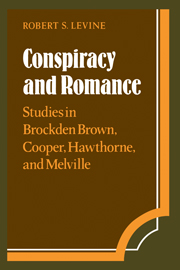2 - “Soulless Corporation”
Oligarchy and the Countersubversive Presence in James Fenimore Cooper's The Bravo
Published online by Cambridge University Press: 05 June 2012
Summary
Here are no aristocratical families, no courts, no kings, no bishops, no ecclesiastical dominion, no invisible power giving to a few a very visible one.
Crèvecoeur, Letters from an American FarmerIt appears to be the melancholy lot of humanity, that every institution which ingenuity can devise shall be perverted to an end different from the legitimate.… So it is with life; in politics, religion, arms, arts and letters, yes, even the republic of letters, as it is called, is the prey of schemers and parasites, and things in fact, are very different from things as they seem to be.
Cooper, Gleanings in Europe: FranceAlthough Fenimore Cooper expressed his admiration for Brockden Brown's fiction in Notions of the Americans (1828), he differed from Brown in celebrating the openness of the trustful American republic, “the only civilized country, I believe, into which a stranger can enter without being liable to intrusion on his privacy by agents of the police.” But despite his avowed lack of concern over the permeability of America's borders, that same year, in private letters to friends, he began to express his own fears of the republic's vulnerability to imperialistic intrigue. Seeking to account for the tense sectional debates on the tariff and Nullification, Cooper came to believe that England was conspiring to divide the Union so as to regain control over its former colony (and in significant ways he anticipated the British government's policies during the American Civil War).
- Type
- Chapter
- Information
- Conspiracy and RomanceStudies in Brockden Brown, Cooper, Hawthorne, and Melville, pp. 58 - 103Publisher: Cambridge University PressPrint publication year: 1989



